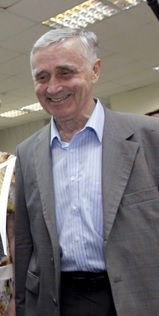Alexander Nikolayevich Skrinsky
Alexander Nikolajewitsch Skrinski ( Russian Александр Николаевич Скринский ; English transcription: Alexander Skrinsky; born January 15, 1936 in Orenburg ) is a Russian physicist who deals with particle accelerators .
Origin and education
Skrinski's father was an automotive engineer in the Red Army , which meant that the family moved frequently. For a time Skrinski lived like this in Berlin , he passed his Abitur in Nizhny Novgorod (then Gorky ). He successfully completed his studies in physics at Lomonosov University in Moscow in 1959.
Career
Skrinski then became a member of Gersch Izkowitsch Budker's research group in Novosibirsk , where he was involved in the construction of the first Russian storage rings ( VEP-1 , an electron-electron collider ). He led a group that built numerous other storage rings in the Soviet Union (VEPP-2, VEPP-4, etc.). In 1978 Skrinski developed the concept of a linear accelerator collider with Vladimir E. Balakin and Budker. Many technical innovations go back to Skrinsky, such as the optical klystron (a variant of the free electron laser ), precision measurements of the masses of elementary particles with resonance depolarization in electron-positron colliders and a method for generating longitudinally polarized particle beams in colliders.
In 1965 Skrinski received his doctorate and from 1969 he was a professor . After Budker's death in 1978, he took over the management of his institute, now called the Budker Institute for Nuclear Physics (BINP) . From 1995 he was a member of the scientific advisory committee at DESY and from 1986 to 1992 in that of the CERN ( Scientific Policy Committee ). He was a member of the International Committee on Future Accelerators (ICFA) and its chairman from 1989 to 1992.
Awards
Skrinski is a Fellow of the American Physical Society and a member of the Russian Academy of Sciences and the Royal Swedish Academy of Sciences . He was awarded the Lenin Prize in 1967 , the State Prize of the USSR in 1989 , the Demidov Prize in 1997 , the Robert R. Wilson Prize in 2002 and the Kapiza Gold Medal in 2004 .
literature
- Andrew Sessler, Edmund Wilson: Engines of discovery . In: World Scientific 2007, p. 156.
Web links
| personal data | |
|---|---|
| SURNAME | Skrinsky, Alexander Nikolajewitsch |
| ALTERNATIVE NAMES | Skrinsky, Alexander; Скринский, Александр Николаевич (Russian spelling) |
| BRIEF DESCRIPTION | Russian physicist |
| DATE OF BIRTH | January 15, 1936 |
| PLACE OF BIRTH | Orenburg |
